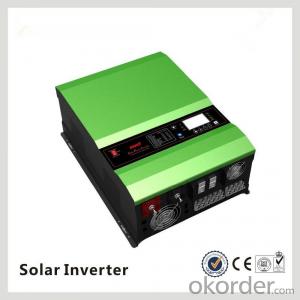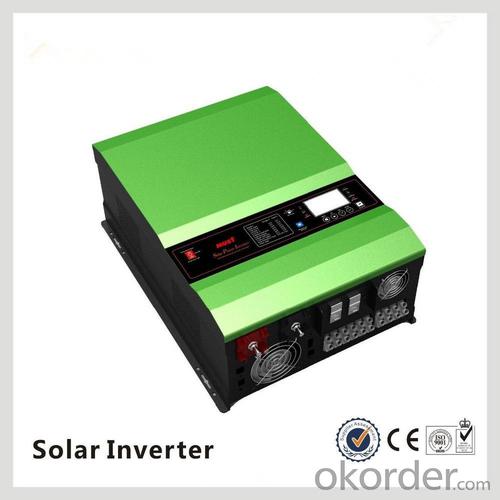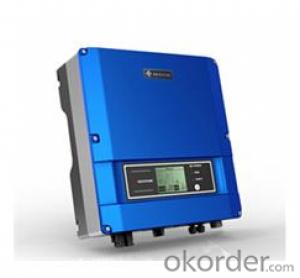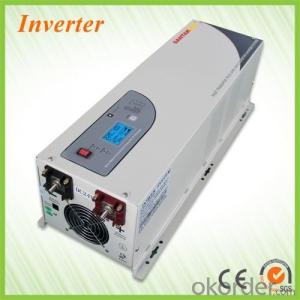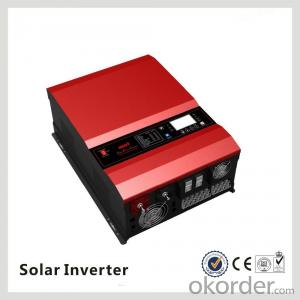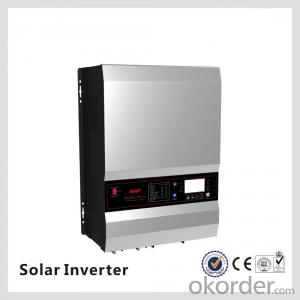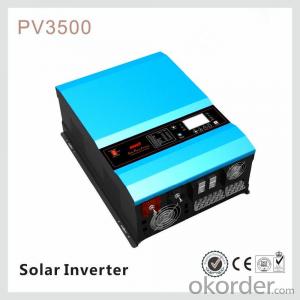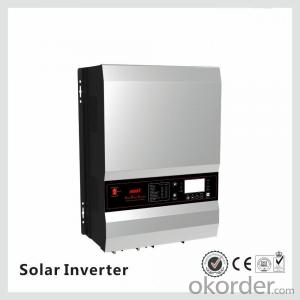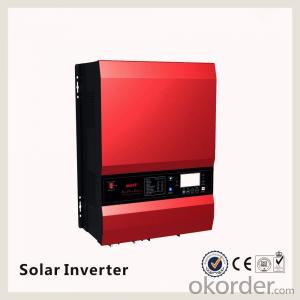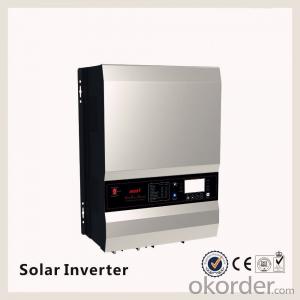Solar Inverter Product PV35-4K Low Frequency DC to AC Solar Power Inverter 12KW
- Loading Port:
- Shanghai
- Payment Terms:
- TT OR LC
- Min Order Qty:
- 10000 watt
- Supply Capability:
- 100000 watt/month
OKorder Service Pledge
OKorder Financial Service
You Might Also Like
Product Description
What is Solar inverter?
Solar pv inverters is an electronic system that operates the photovoltaic(PV) modules in a manner that allows the modules to produce all the power they are capable of. The solar mate charge controller is a microprocessor-based system designed to implement the MPPT. It can increase charge current up to 30% or more compared to traditional charge controllers.
Features
· Power range 1KW - 12KW
· Inbuilt pure copper transformer
· Powerful charge rate up to 100Amp
· MPPT solar charge controller 45A 60A (120A Option)
· PV input:145V max
· 12V/24V/36V/48V auto work
· MPPT efficiency>99% , Peak conversion efficiency>98%
· DSP processors architecture ensure high speed and performance
· Four-stages charging mode
· Protection: PV array short circuit, PV reverse polarity, Battery reverse polarity, Over charging, Output short circuit
· High efficency design & "Power Saving Mode" to coverse energy
Specification
MODEL | PV35-1K | PV35-2K | PV35-3K | PV35-4K | |||||||||||||||
Default Battery System Voltage | 12VDC | 24VDC | 12VDC | 24VDC | 12VDC | 24VDC | 12VDC | 24VDC | |||||||||||
INVERTER OUTPUT | Rated Power | 1KW | 2KW | 3000VA/2.4KW | 4000VA/3.2KW | ||||||||||||||
Surge Rating (20ms) | 3KW | 6KW | 9KW | 12KW | |||||||||||||||
Capable Of Starting Electric Motor | 1HP | 1HP | 1.5HP | 2HP | |||||||||||||||
Waveform | Pure sine wave/ same as input (bypass mode) | ||||||||||||||||||
Nominal Output Voltage RMS | 100V/110V/120VAC 220V/230V/240VAC(+/-10% RMS) | ||||||||||||||||||
Output Frequency | 50Hz/60Hz +/-0.3 Hz | ||||||||||||||||||
Inverter Efficiency(Peak) | >88% | ||||||||||||||||||
Line Mode Efficiency | >95% | ||||||||||||||||||
Power Factor | 0.8 | ||||||||||||||||||
Typical Transfer Time | 10ms(max) | ||||||||||||||||||
AC INPUT | Voltage | 230VAC | |||||||||||||||||
Selectable Voltage Range | 96~132VAC/155~280VAC(For Personal Computers) | ||||||||||||||||||
Frequency Range | 50Hz/60Hz (Auto sensing) 40-80Hz | ||||||||||||||||||
BATTERY | Minimum Start Voltage | 10.0VDC /10.5VDC for12VDC mode (*2 for 24VDC, *4 for 48VDC) | |||||||||||||||||
Low Battery Alarm | 10.5VDC+/-0.3V for12VDC mode (*2 for 24VDC, *4 for 48VDC) | ||||||||||||||||||
Low Battery Cutoff | 10.0VDC+/-0.3V for12VDC mode (*2 for 24VDC, *4 for 48VDC) | ||||||||||||||||||
High Voltage Alarm | 16.0VDC+/-0.3V for12VDC mode (*2 for 24VDC, *4 for 48VDC) | ||||||||||||||||||
High Battery Voltage Recover | 15.5VDC+/-0.3V for12VDC mode (*2 for 24VDC, *4 for 48VDC) | ||||||||||||||||||
Idle Consumption-Search Mode | <25W when power saver on | ||||||||||||||||||
CHARGER | Output Voltage | Depends on battery type | |||||||||||||||||
Charger AC Input Breaker Rating | 10A | 30A | 30A | 30A | |||||||||||||||
Overcharge Protection S.D. | 15.7VDC for 12VDC mode (*2 for 24VDC, *4 for 48VDC) | ||||||||||||||||||
Maximum Charge Current | 45A | 25A | 70A 35A | 90A 50A | 65A 40A | ||||||||||||||
BTS | Continuous Output Power | Yes Variances in charging voltage & S.D. voltage base on the battery temperature | |||||||||||||||||
BYPASS & PROTECTION | Input Voltage Waveform | Sine wave (grid or generator) | |||||||||||||||||
Nominal Input Frequency | 50Hz or 60Hz | ||||||||||||||||||
Overload Protection (SMPS Load) | Circuit breaker | ||||||||||||||||||
Output Short Circuit Protection | Circuit breaker | ||||||||||||||||||
Bypass Breaker Rating | 10A | 15A | 20A | 40A | |||||||||||||||
Max Bypass Current | 30Amp | ||||||||||||||||||
SOLAR CHARGER | Maximum PV Charge Current | 45A | |||||||||||||||||
DC Voltage | 12V/24V atuo work | ||||||||||||||||||
Maximum PV Array Power | 600W | 1200W | 600W | 1200W | 600W | 1200W | 600W | 3200W | |||||||||||
MPPT Range @ Operating Voltage(VDC) | 16-100VDC for 12V mode,32-100V for 24V mode | ||||||||||||||||||
Maximum PV Array Open Circuit Voltage | 100VDC | 147VDC | |||||||||||||||||
Maximum Efficiency | >98% | ||||||||||||||||||
Standby Power Consumption | <2w< span=""> | ||||||||||||||||||
MECHANICAL SPECIFICATIONS | Mounting | Wall mount | |||||||||||||||||
Dimensions (W*H*D) | 493*311*215mm | ||||||||||||||||||
Net Weight (Solar CHG) kg | 23.5 | 24.5 | 25.5 | 29.5 | |||||||||||||||
Shipping Dimensions(W*H*D) | 580*400*325mm | ||||||||||||||||||
Shipping Weight (Solar CHG) kg | 25.5 | 26.5 | 27.5 | 31.5 | |||||||||||||||
OTHER | Operation Temperature Range | 0°C to 40°C | |||||||||||||||||
Storage Temperature | -15°C to 60°C | ||||||||||||||||||
Audible Noise | 60dB MAX | ||||||||||||||||||
Display | LED+LCD | ||||||||||||||||||
Loading(20GP/40GP/40HQ) | 150pcs/300pcs/350pcs | ||||||||||||||||||
Images
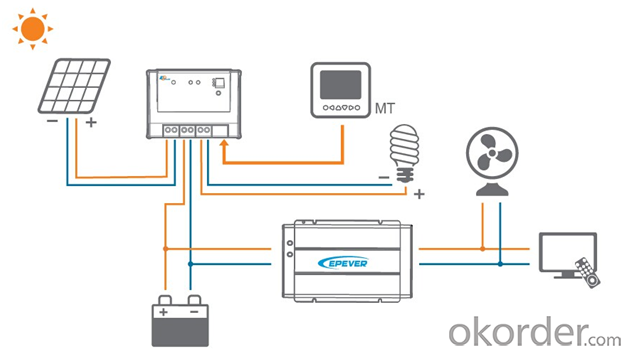
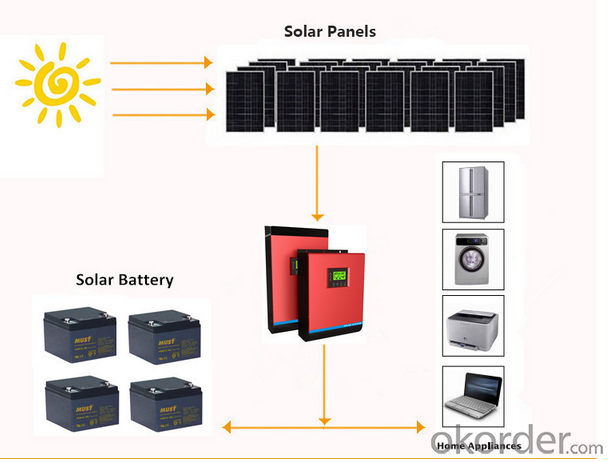
Packaging & Shipping
What is the packing?
1.Package: Carton Box for packaging, or Wooden Box advised for Samples to protect in transportations. Package designed by Clients is welcomed.
2.Shipping: DHL,FEDEX,UPS,EMS,AirWay and By Sea.
3.Payment: T/T( telegraphic transfer (T/T) and Western Union
4.Welcome to your Sample Order to test First.
FAQ
Q1: How to choose a right inverter?
A1:Tell us your demand, then our sales will recommend a suitable inverter to you.
Q2: What's the different between inverter and solar inverter?
A2: Inverter is only accept AC input, but solar inverter not only accept AC input but also can connect with solar panel to accept PV input, it more save power.
Q3: How about the delivery time?
A3: 7 days for sample; 25 days for bulk order.
- Q: How does shading impact the performance of a solar inverter?
- Shading can significantly affect the performance of a solar inverter. When certain parts of a solar panel are shaded, the overall power output of the system decreases. This is because shaded cells create resistive losses, reducing the current flow and overall efficiency of the inverter. Additionally, shading can cause a phenomenon known as the "partial shading effect," where the entire string of panels is affected even if only a small portion is shaded. To mitigate these issues, technologies like bypass diodes are used in solar panels to minimize the impact of shading and ensure optimal performance of the inverter.
- Q: Can a solar inverter be used with other renewable energy sources like wind or hydro power?
- Yes, a solar inverter can be used with other renewable energy sources like wind or hydro power. Inverters are designed to convert the direct current (DC) produced by renewable energy sources into alternating current (AC) that can be used to power homes and businesses. So, by connecting wind turbines or hydroelectric generators to a solar inverter, the generated DC power can be efficiently converted and integrated into the electrical grid or used for various applications.
- Q: Can a solar inverter be used in a multi-string configuration?
- Yes, a solar inverter can be used in a multi-string configuration. In fact, many modern solar inverters are designed to handle multiple strings of solar panels. This configuration allows for more flexibility in system design and improves overall performance and efficiency of the solar power system.
- Q: PV grid-connected inverter can directly load it?
- TL5001 operating voltage range of 3.6 ~ 40V, its internal with an error amplifier, a regulator, oscillator, a dead zone control PWM generator, low voltage protection circuit and short circuit protection circuit
- Q: What is the role of a solar inverter in a solar-powered electric vehicle charging station?
- The role of a solar inverter in a solar-powered electric vehicle charging station is to convert the direct current (DC) produced by the solar panels into alternating current (AC) that can be used to charge electric vehicles. The inverter ensures that the electricity generated by the solar panels is compatible with the charging station and the electric vehicle's charging requirements.
- Q: What is the maximum AC output power of a solar inverter?
- The maximum AC output power of a solar inverter can vary depending on the specific model and size. Generally, residential solar inverters have a maximum AC output power ranging from 1 kilowatt (kW) to 10 kW, while commercial and utility-scale inverters can have much higher maximum AC output power, reaching up to several megawatts (MW).
- Q: Can a solar inverter be used in systems with multiple inverters?
- Yes, a solar inverter can be used in systems with multiple inverters. In fact, in large-scale solar installations, multiple inverters are often used to handle the increased power output. These inverters are connected in parallel or series to ensure efficient and reliable operation of the entire system.
- Q: Are there any noise or vibration concerns associated with solar inverters?
- Solar inverters can cause noise and vibration problems, but the severity of these issues depends on the specific make and model of the inverter. Some inverters may emit a gentle humming or buzzing sound, which is generally considered normal. However, if the noise becomes excessively loud or disruptive, it may indicate a malfunctioning or poorly installed inverter. Likewise, vibrations can occur in solar inverters, especially if they are not properly secured or mounted. These vibrations can potentially result in additional noise or even lead to damage if not addressed. To mitigate these concerns, it is essential to follow proper installation and maintenance practices, such as securely fastening the inverter and regularly inspecting for loose components or abnormal vibrations. It's worth noting that advancements in technology have resulted in the development of quieter and more efficient solar inverters. When selecting an inverter for a solar system, it is advisable to research and choose a reputable brand known for producing inverters with minimal noise and vibration issues. Additionally, consulting with a professional solar installer can provide valuable insights and recommendations to ensure a smooth and quiet operation of the solar inverter.
- Q: Can a solar inverter be used in a floating solar system?
- Yes, a solar inverter can be used in a floating solar system. In fact, a solar inverter is an essential component of any solar power system, including floating solar systems. The purpose of a solar inverter is to convert the direct current (DC) electricity produced by the solar panels into alternating current (AC) electricity that can be used to power electrical appliances or be fed into the grid. Whether the solar panels are installed on the ground, on rooftops, or on a floating platform, a solar inverter is necessary to ensure the efficient and safe conversion of solar energy into usable electricity.
- Q: How does a solar inverter handle voltage stability in the grid?
- A solar inverter handles voltage stability in the grid by continuously monitoring the voltage levels and adjusting its output accordingly. It ensures that the electricity generated from solar panels is synchronized with the grid voltage, maintaining a stable voltage level. Additionally, advanced solar inverters incorporate features like voltage regulation and reactive power control to further enhance voltage stability in the grid.
Send your message to us
Solar Inverter Product PV35-4K Low Frequency DC to AC Solar Power Inverter 12KW
- Loading Port:
- Shanghai
- Payment Terms:
- TT OR LC
- Min Order Qty:
- 10000 watt
- Supply Capability:
- 100000 watt/month
OKorder Service Pledge
OKorder Financial Service
Similar products
Hot products
Hot Searches
Related keywords
